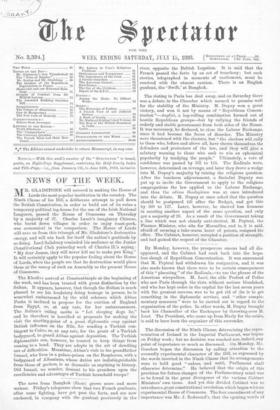The rioting in Paris has died away, and on Saturday
there was a debate in the Chamber which seemed to promise well for the stability of the Ministry. M. Dupuy won a great victory, and won it not by means of " Republican Concen- tration "—Anglick a logrolling combination formed out of hostile Republican groups—but by rallying the friends of orderly and stable government from both sides of the House. It was necessary, he declared, to close the Labour Exchange, since it had become the focus of disorder. The Ministry were threatened with the electors, but "the electors will rally to those who, before and above all, have shown themselves the defenders and protectors of the law, and they will give a salutary warning to those who seek to win an ephemeral popularity by toadying the people." Ultimately, a vote of confidence was passed by 332 to 124. The Radicals were, however, determined on revenge, and later they drove a wedge into M. Dupuy's majority by raising the religious question. After the luncheon adjournment, a Socialist Deputy was put up to invite the Government to apply to the religious congregations the law applied to the Labour Exchange, and thus the odium, theologicum was at once introduced into the debate. M. Dupla, at once asked that the question should be postponed till after the Budget, and got this by 360 to 127. Later, however, he showed less firmness in meeting another aspect of the same question, and only got a majority of 26. As a result of the Government taking a line which was not clearly anti-clerical, M. Peytral, the Finance Minister, who sits for Marseilles, and is, it is said, afraid of seeming a luke-warm hater of priests, resigned his office. The Cabinet, however, occupied a position of strength, and had gained the respect of the Chamber.


































